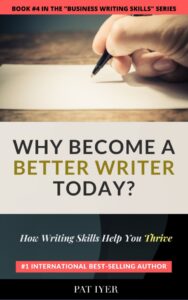I always loved reading more than almost any other activity. It’s no coincidence that my siblings are also avid readers. I believe this habit made us better writers.
Our mother instilled the love of reading in us. Whenever any of us complained about boredom, she said, “Read a book.” All her life, she practiced what she preached. In the last years of her life, one of her treasured activities and friendships involved her book club.
My siblings and I are published writers, and we give my mother full credit for steering us on this career path. My sister writes fiction; my brother writes music books. I write books about writing and legal nurse consulting.
While there’s no substitute for learning to love reading at an early age, it’s never too late to acquire this pleasure. You can also motivate yourself to improve your writing discovering what does and doesn’t work in the art of writing.
Reading Magazines and Newspapers Helps, Too with Becoming Better Writers
Read the news or a magazine online. If you are also working on learning grammatical rules, you can learn a lot by the kinds of mistakes those who have to provides volumes of text make.
Sorry, CNN, but you’re currently occupying the top of my list with this headline:
“After swimming from Cuba to Key West, at age 64, Dr. Sanjay Gupta asked Diana Nyad about how she’s staying fit into her 70’s.”
When I read this a few times, I figured that Dr. Gupta was not the swimmer, but a headline that initially confuses a reader fails. To be sure that Diana Nyad made this swim, I had to actually read it. I suppose that’s one way of getting someone to click on a headline, but I don’t recommend.
The problem is that the dependent clause, “After swimming . .” refers to Dr, Gupta, not Diana Nyad.
Here’s how I would rewrite it, after gasping at the idea that one could actually swim that distance.
“Dr. Sanjay Gupta asked Diana Nyad, who swam from Cuba to Key West, at age 64, how she’s staying fit in her 70s.”
I replaced “into:” with “in” and changed “70’s” to “70s.” Those apostrophes like to show up where they don’t belong.
Do analyze those headlines. I suspect that they’re often the last parts of the article written, usually in a rush. Also look at the hook (usually the first paragraph of a story, designed to keep the reader reading). Do the paragraphs follow each other logically, transitioning smoothly from one thought to the next?
This kind of studying can help you structure your blog posts so that your readers will enjoy and learn from your writing.
If you plan to read a book, you can use the same kind of analysis, although in a less detailed way. For example, reading the table of contents can teach you a lot about non-fiction book structure.
If you would like to be a better writer by adding more elegance to your writing, read fiction. You don’t need to read great classics—although in his day, Dickens’ novels were considered pure entertainment. Reading book reviews can help guide you to novels you’ll enjoy.
Pay attention to the use of language. Do sentences flow? What makes that happen? Noticing this subtleties makes us better writers.
Why Become a Better Writer Today: This book guides you through some key areas where you can improve your skills. It takes up issues of positive mindset, the importance of reading extensively, grammar, spelling, and punctuation.
Most of all, it will demonstrate, through many examples, how accurate writing can make a huge difference in your professional life. Order it at this link.

Join a Book Club
Being a book club member has a number of advantages. You make a commitment to read a book a month. All members don’t always honor this commitment, but do your best.
You’ll get to compare your opinions about the book with those of others. When you first join, you may want to keep your views low-key. Learn the style of communication among participants.
If the book club meetings are live, you will get to drink wine and eat good food—unless the meetings take place in a library. I started a book club with members of my church, and we met monthly for several years in each others’ homes. It was great fun.
You can also find online book clubs. Book Clubs Online offers romance, science fiction, fantasy, horror, classics, and much more.
Join a writers’ critique group
Your odds of finding a compatible group are much better online than in your geographic location. The lists 42 places where you can find a group or critique partner.
Immersion in a critique group or with a partner will get you to take a microscopic look at the principles of writing and the techniques of better writers. It’s always so much easier to see other’s mistakes than your own.
Be aware that each group has its standards of conduct and criteria for critiques. Learn the rules and follow them. If the group doesn’t work for you, move on.
Do you have to have something you want critiqued in order to join a group? It doesn’t have to be critique-worthy, but I feel you should have something in progress, being in a critique group can facilitate its development.
Using one or more of these suggestions will improve your writing, making you a better writer. You may also meet interesting people who may later become your allies in navigating the publishing world.
 Pat Iyer MSN RN LNCC is a consultant, speaker, author, editor and coach. She has written or edited over 60 of her own books and worked with a few dozen authors. Pat is an Amazon international #1 bestselling author. Coaches, consultants, and speakers hire Pat to help release the knowledge inside them so that they can attract their ideal clients.
Pat Iyer MSN RN LNCC is a consultant, speaker, author, editor and coach. She has written or edited over 60 of her own books and worked with a few dozen authors. Pat is an Amazon international #1 bestselling author. Coaches, consultants, and speakers hire Pat to help release the knowledge inside them so that they can attract their ideal clients.
She delights in assisting people to share their expertise by writing. Pat serves international and national experts as an editor, book coach, and a medical and business writer.
